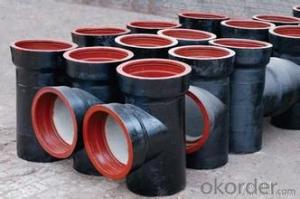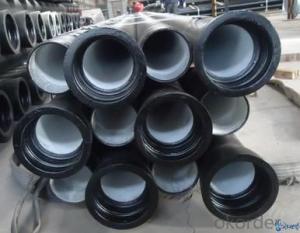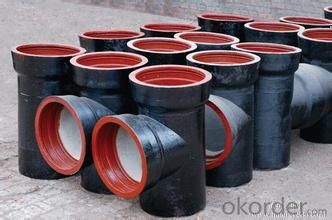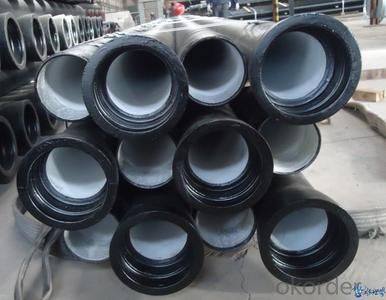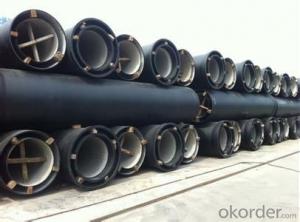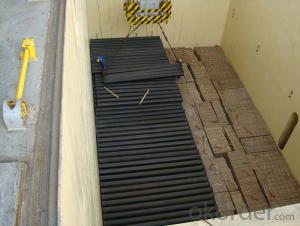DUCTILE IRON PIPE K9 DN1000
- Loading Port:
- China Main Port
- Payment Terms:
- TT OR LC
- Min Order Qty:
- -
- Supply Capability:
- -
OKorder Service Pledge
OKorder Financial Service
You Might Also Like
Ductile Iron Cast Pipe is without any defects compare with tradition casting tech, which has many advantages particularly as follow:
(1) High density. In the "vertical upward casting" process, the melt iron of centre liquid column in center crystallizer is continuously feeding for volume shrinkage caused by condensation tube at outer circumference , which lead to be free of shrinkage porosity.
(2) High purity. When melt iron pouring, the mixed impurities such as gas, dross, sand grain which are lighter than melt iron could be eliminated at furnace mouth, its impossible to enter into the crystallizer through the channel, so the melt iron into the crystallizer is very pure.
(3) Strength with toughness. The cooling speed provided by continuous crystallizer is 30 times than sand casting and 5 times than centrifugal casting, and doesn't produce white iron, the eutectic cell volume of continuous cast iron is one eighth to one tenth compare with traditional cast iron. The density of graphite nodule in ductile iron can reach 300-700 pcs/mm2. Therefore, all reason above improve the strength and toughness of continuous cast iron.
(4) Free machining. The high speed cooling make the hardening phase (such as boride, steadite) not appear like reticular, massive or thick, but diffuse like fish bone and pane in shape, moreover, there are tiny graphite flakes inlaid hardening phase. It's free machining in BrinellHardness the range of 250-300HB. However, the Brinell Hardness of 250 is top limit to common metal materials.
(5) Uniform composition of tube wall. The convection mixing of liquid column caused by marching type drawing in crystallizer make the composition of tube wall well-distributed, and concentration gradient very little.
(6) High productivity. To the wall thickness of tube under 10mm, the speed of continuous casting is 1 meter/min, to the wall thickness of tube under 20mm, the speed of continuous casting is 0.5 meter/min, which is high efficiency that centrifugal or other casting tech couldn't reach.
- Q: How do ductile iron pipes perform in acidic soil conditions?
- Ductile iron pipes are known for their durability and resistance to various environmental conditions, including acidic soil conditions. When exposed to acidic soil, ductile iron pipes demonstrate excellent corrosion resistance due to their unique composition and protective coating. The high carbon content in ductile iron pipes provides them with inherent resistance to corrosion, even in acidic environments. Additionally, the pipes are typically lined with cement mortar or a suitable epoxy coating, which acts as an additional layer of protection against acid attack. The combination of the high carbon content and protective coating creates a barrier that prevents the acid from directly contacting the iron, thus minimizing the risk of corrosion. This ensures that the pipes remain structurally sound and maintain their integrity over an extended period of time. Furthermore, ductile iron pipes have a long service life and are designed to withstand a wide range of soil conditions. Their inherent strength and flexibility enable them to endure the stresses and strains caused by the surrounding soil, including acidic soil environments. This makes them an ideal choice for applications where the soil has a higher acidity level. It is important to note that while ductile iron pipes perform well in acidic soil conditions, the severity and concentration of the acid can impact their performance. In extremely aggressive or highly concentrated acidic environments, additional corrosion protection measures may be necessary, such as the use of sacrificial anodes or cathodic protection systems. In conclusion, ductile iron pipes are highly resilient and perform exceptionally well in acidic soil conditions. Their corrosion resistance, combined with their robust structure and protective coating, ensures their longevity and reliability, making them a preferred choice for various applications in such environments.
- Q: Can ductile iron pipes be used for irrigation systems in saline soil conditions?
- Yes, ductile iron pipes can be used for irrigation systems in saline soil conditions. Ductile iron pipes have excellent corrosion resistance properties, making them suitable for use in saline environments. However, it is important to consider the specific requirements and consult with experts to ensure proper selection and installation methods are implemented for optimal performance and durability in such conditions.
- Q: What's the difference between cast iron pipe and steel pipe?
- Steel tube (Steel pipe) production technology development began in the bicycle manufacturing industry, the rise of the early nineteenth Century during the oil development, the two world war ships, boilers, aircraft manufacturing, manufacturing of power boiler after the Second World War, the development of chemical industry of petroleum and natural gas drilling and transportation, will effectively promote the the yield and quality of varieties, the development of steel tube industry.
- Q: Is the fire hose capable of using rapid repair joints?
- Lubrication. Edible oil can be used as lubricant and evenly brush on the socket end and rubber ring.
- Q: Can ductile iron pipe be used for water treatment plants?
- Yes, ductile iron pipe can be used for water treatment plants. Ductile iron pipes are known for their strength, durability, and corrosion resistance, making them suitable for transporting water and other fluids in various industrial applications, including water treatment plants.
- Q: What is the disadvantage of nodular cast iron in excess of silicon?
- Silicon has a great influence on the performance of nodular cast iron. It mainly shows that silicon can refine graphite and improve the roundness of graphite ball.
- Q: Can ductile iron pipe be used for wastewater treatment plant sludge handling?
- Indeed, ductile iron pipe is suitable for the handling of sludge in wastewater treatment plants. Possessing strength and durability, this material resists corrosion and endures the challenging conditions related to sludge management. Frequently employed in wastewater treatment plants for sludge transport, it ensures remarkable structural integrity and boasts an extended lifespan. Moreover, ductile iron pipe proves effortless to install and maintain, rendering it a pragmatic selection for sludge handling purposes within wastewater treatment plants.
- Q: How do ductile iron pipes handle differential settlement?
- Ductile iron pipes have the ability to handle differential settlement due to their inherent flexibility and strength. The material's ductility allows the pipes to withstand minor ground movements and settlement without causing significant damage or failure. The pipes can flex and adjust to the changing ground conditions, reducing the risk of cracks or breaks. Additionally, the inherent strength of ductile iron pipes helps distribute the load evenly, minimizing the impact of settlement on the overall integrity of the pipeline system.
- Q: What are the different types of valves available for ductile iron pipe?
- There are several types of valves available for ductile iron pipe, including gate valves, butterfly valves, check valves, ball valves, and globe valves.
- Q: What is the expected hydraulic performance of ductile iron pipes?
- The expected hydraulic performance of ductile iron pipes is generally excellent due to their smooth internal surface, which minimizes friction and pressure drop, allowing for efficient flow of water or other fluids. Additionally, their high strength and durability ensure long-term reliability and minimal leakage, making ductile iron pipes a preferred choice for water supply and drainage systems.
Send your message to us
DUCTILE IRON PIPE K9 DN1000
- Loading Port:
- China Main Port
- Payment Terms:
- TT OR LC
- Min Order Qty:
- -
- Supply Capability:
- -
OKorder Service Pledge
OKorder Financial Service
Similar products
Hot products
Hot Searches
Related keywords
